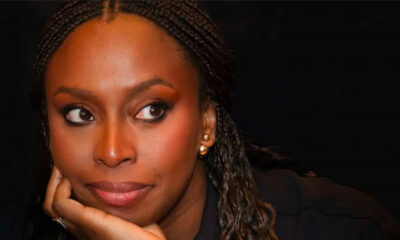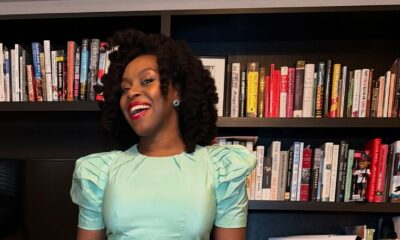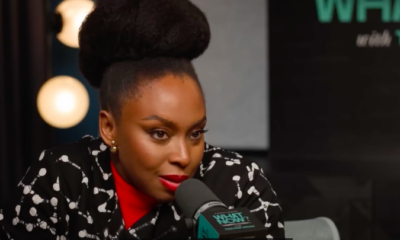News
Chimamanda Ngozi Adichie gets Candid on Wanting to be Addressed as Ms., Feminism & the Beauty of Igbo Language
Nigerian author Chimamanda Ngozi Adichie recently had a candid interview with the Sun Newspaper.
In it, she discusses growing up, her parents’ influence on her career, wanting to be called a Miss instead of Mrs, Feminism and the beauty of Igbo language.
The interviewer kicks off the conversation by addressing her as Mrs Chimamanda Adichie, she quickly responded with “Before we start, please, I just want to say that my name is Chimamanda Adichie. That’s how I want it; that’s how I’m addressed, and it is not Mrs but Miss. Ms: that’s how I want it. I am saying this, because I just got a mail from my manager this morning. It seems that there are people who attended the church service, and they wrote about it, addressing me as Mrs. Chimamanda (Esega). I didn’t like that at all. So my name is Chimamanda Adichie, full stop!”
She further explains “This is because it is also responsible that people be called what they want to be called.”
Read excerpts from the interview;
On studying medicine, and later changing to pharmacy: “I did, because, in this part of the world, when you perform well in school, they’ll tell you that you’ll become a medical doctor. So, that’s why. When I was in the secondary school, I remember I took SSCE, and I got the best result in the history of the school.
Previously, people had been getting five. As and six As; but I got eleven (11) As. Everybody in the school was so happy. Since, it was in the junior secondary school category, afterwards the school authorities would put you in either science or arts; and I remember that, even then, I was very interested in arts.
I wanted to study history; I wanted to study French; I wanted to study literature, but, because I got the best result, they put me immediately in science class; immediately, no questions –and it was because of that thinking that, once you are brilliant, you are destined to go into sciences, which is a very pure fallacy. So, that’s how I was put in the science class. For Jamb UME; I put medicine, because that was what I was rather expected to do. I got in there, but my heart wasn’t there. I knew from the beginning, my heart wasn’t there. I was doing well anyway, but my heart was not there. So, that’s why I decided to leave –and I think it is the best decision I ever made.”
On not interpreting Igbo sentences in her novels: “It’s because I want people to go and learn Igbo. Many of my editors, many of them disapprove of that style, but I refused. I tell them it is because of two reasons: one is because Igbo is a peaceful and beautiful language; and my language matters so much to me, and, also, I am writing about a people who are speaking both languages; another reason is that when I was growing up, I read books where characters speak French –a book in English, and you will see one sentence in French, and nobody explains that.
We were supposed to try and understand. So, if you can do that with French, why not Igbo? Both of them are beautiful languages. So, I don’t take any excuses for that. There are many editors I have quarreled with be-cause of that. I know because, if you read it carefully, you can kind of understand what it is. And, then, if you are really that curious, you can go online and learn it; you can go and learn Igbo. There are Igbo programmes in various universities. It is not that hard.”
On if it doesn’t bother her if her readers don’t understand: “Almost one million people from across the globe read Half of the Yellow Sun, and they understood, and it has Igbo words in it. So, it didn’t bother them. Also, as a writer, I read books with little bits of the languages I don’t understand, but it doesn’t really; in fact, it gives me the flavours of that language, and I like that.
I think the question is a bigger question about the family and our language, because, if I wrote French in a book, I don’t think I would be asked questions about it, because the ideas are French. You can put French in an English book, it’s OK; but because it is Igbo, and we think Igbo doesn’t have that much value, people will get confused. Igbo is as beautiful as any other language.
So, I urge parents to allow their children to speak Igbo language. Some Igbo educated parents don’t allow their children to speak Igbo. It’s a disaster. They should just speak Igbo. Ndi’gbo can’t even read Igbo. It troubles immensely, because we are losing so much. It is very easy to speak Igbo language.
The same Igbo parents, who don’t teach their children Igbo, teach them French. It’s very annoying. I don’t even want to lose my voice talking about it because it is a very sad thing. My friends, who are Yoruba, would prefer their children to speak their language.
Many of them live abroad, but still speak Yoruba. But, even in Igbo land, when you speak Igbo to your fellow Igbo, they will start speaking English in response, because we now think that our language is so low that we have to show that we have arrived by speaking English. It is just terrible.”
On stating she’s a feminist in an interview: “Oooh! Is that when I said that, because that quote has followed me everywhere in the world? That’s why I don’t like granting interviews, because whatever you say, in 20 years, you’ll still be quoted. Oh I said I’m a feminist? You know, what I meant was that: you know when people hear feminism, many things come into their head.
What I wanted him to understand is that feminism doesn’t mean that you want to be a man. I’m a feminist, I’m a female; a feminist meaning that I want to look like a woman, but I want the equal respect that a man has. I think that human being should be respected based on their achievements and not based on whether you’re a man or woman. But, since I said that, everywhere I go, people are asking about that. I went to Australia, and they had read that; they knew about that. I was on stage in a hall full of people.
They said they had a special present for me, and they brought in purse. I just started laughing. It was hilarious. But this is why you should be careful what you say. It was so funny. All the way in Australia!”
On starting the conversation by stating she is not a Mrs: “(cuts in) My name is Chimamada Adichie. If you want to put label for me, put Ms.”
On culture playing a part as being Mrs: “(Cuts in again) What does our culture do? Let me tell you about our culture. This thing that you are calling our culture –that when you marry somebody, you’ll start call-ing her Mrs. Somebody –is not our culture; it is Western culture. If you want to talk about our culture, you need to go to people in real Igbo land. But it is true.
My grandfather’s name is David. His name is also Nwoye. They call him Nwoye Omeni. Omeni was his mother. You know why? It is to help distinguish him, because there are often many wives. So, it was his mother that they used to identify him. They know that all of these people came from the same compound, but whose child is this one. You may go and ask people who is Nwoye Omeni, and they’ll tell you it is my grandfather. So, conversation about culture is a long one. I don’t even want to have it.”
On if she’ll change her last name: “Yes; because it’s all fused. You cannot then come and impose something on somebody. Nobody should come and impose something on somebody, because, if you come and tell me it is our culture, I’ll tell you it is not our culture. Where do you want to start counting? Do you want to start counting in 1920, or do you want us to start counting from 1870?”




















